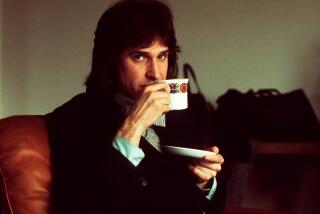JAZZ REVIEW : Miles Davis Band, 1990 Model: Trim, Slick
- Share via
SAN JUAN CAPISTRANO — The latest model of the Miles Davis band is built for speed. It’s trim. Tight. You might even say “slick.”
Recent Davis ensembles wove synth chords and percussion into lush backgrounds from which solos would spring. The current, streamlined version, which played Friday night at the Coach House, relied more on interplay, counterpoint and sharp exchange. Percussion, now mostly electronic, accented the beat rather than embellishing and extending it. Davis dragged guitarist Foley or alto saxophonist Kenny Garrett out to center stage for some call and response, then left them there to fend for themselves while the rhythm section clicked on.
But don’t be caught thinking this is a dramatic change in direction for the trumpeter. The new approach, which makes Davis’ current music his most accessible ever, made for only subtle variations in the way the band attacked the mostly familiar material (this is Davis’ third appearance in San Juan Capistrano in the past nine months). The difference was lost on at least one member of the audience who was overheard complaining that Davis played “the same songs he played last time.”
Surprisingly, the trumpeter’s best moments came during two of his most well-worn, but also most melodic, selections. Michael Jackson’s “Human Nature” had Davis blowing long, squirming lines through muted trumpet before opening the bell of his horn to make short, assertive statements. During the second show, Cyndi Lauper’s “Time After Time,” a tune Davis has been playing live since he first recorded it in 1985, served the same purpose.
New on the play list was “In the Night,” the soft funk number from Cameo’s “Machismo” album on which Davis makes an appearance. The tune’s easy groove, as indicative of the trumpeter’s current thinking as anything played Friday, was underscored by percussionist John Bigham’s vocal chorus.
But if this is a funk band, then it’s one of the best around. Saxophonist Garrett relied less on repeated lines and dramatic, squawking one-note rides than in the past. Instead, his solos steamed through long, expressive lines, sometimes with a twist of dissonance thrown in to give things an edge. Keyboardist Kei Akagi provided rhythmic punch and chordal color. Not since Herbie Hancock has Davis had a keyboardist as adept at the spare, insidious style of accompaniment that he’s always favored. Drummer Ricky Wellman was solid and soulful, sparring handily with bassist Benny Rietveld, who slipped in a bit of George Shearing’s “Lullaby of Birdland” while trading lines with Davis.
The trumpeter, never known for his on-stage banter, acknowledged his group members by holding up large signs lettered with the player’s name after well-received efforts.
And the old jazz-club wisdom that says later sets are always better than the first certainly applied here. Friday’s first set was brief (less than an hour) while the second show, which included solos from Akagi and Wellman that were missing from the first show, seemed more intense and extended well beyond an hour.
Absent from both shows was “Mr. Pastorius,” the space-walk-paced tribute to the late bassist that appeared on the most recently recorded Davis release, “Amandala.” Some thought the tune signaled a more introspective direction from the trumpeter. But it appears that the lyrical ballad just didn’t fit into his new, slicker scheme of things.
More to Read
The biggest entertainment stories
Get our big stories about Hollywood, film, television, music, arts, culture and more right in your inbox as soon as they publish.
You may occasionally receive promotional content from the Los Angeles Times.










